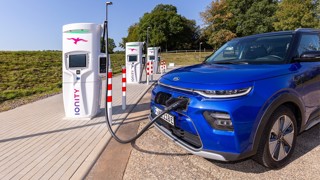Nine local authorities will receive a share of £20 million through a new pilot to install more than 1,000 public charge points.
The Local EV Infrastructure (LEVI) pilot scheme is aimed at delivering commercial EV charging infrastructure for residents, from faster on-street charge points to larger petrol station-style charging hubs.
The announcement comes as concerns over the ability to charge vehicles dominate the list of factors why some UK businesses are delaying car and van electrification, according to Arval Mobility Observatory research.
Companies that have not yet adopted any electric vehicles (EVs) were asked their reasons why in the survey.
The top answer was not enough public charging points (50%) and they also listed no charging solution at an employee’s offices (40%) or at an employee’s home (35%), yet only 12% responded that employees are reluctant to drive EVs.
The LEVI scheme is backed by £10m of Government funding shared among the nine winning local authorities in the first tranche of what will be a £450m scheme, with winning pilot bids supported by an additional £9m in private funding. A further £1.9m will come from public funds across local authorities.
The local authorities winning a share of the initial £20m funding are Barnet, Dorset, Durham, Kent, Midlands Connect (with Lincolnshire as a lead authority), North Yorkshire, Nottinghamshire, Suffolk and Warrington.
Decarbonisation minister Trudy Harrison said: “We want to expand and grow our world-leading network of EV charge points, working closely with industry and local government, making it even easier for those without driveways to charge their electric vehicles and support the switch to cleaner travel.
“This scheme will help to level up electric vehicle infrastructure across the country, so that everyone can benefit from healthier neighbourhoods and cleaner air.”
The new LEVI fund builds on the On-Street Residential Charge point Scheme (ORCS) which has seen almost 2,900 charge points installed so far with funding provided for approaching 10,000 additional charge points in the future.
Following growing demand from local authorities, the Government is also announcing a further £10m in funding, which has been brought forward for this year, bringing this year’s ORCS funding to £30m to help maintain ongoing installations.
Jon Lawes, managing director of Novuna Vehicle Solutions, said: “Today’s announcement is a welcome step in the right direction, particularly as many of the local authorities involved in the programme have fewer public EV charging points than the national average of 48 per 100,000 of the population.
“However, there is still a considerable way to go to provide adequate EV charging infrastructure - demand for electric vehicles continues to rise up and down the country, yet public charging provision is failing to keep pace with EV registrations and remains insufficient in the majority of parts of the UK.”
Meryem Brassington, electrification propositions lead at Lex Autolease, believes that if the UK is to lead the way in electrification, then expanding the network of charge points is "mission critical".
"Electric vehicle adoption levels are dominating the new car market and for this momentum to continue, drivers need access to widely available charging stations," she said. "This is particularly important for motorists without driveways to ensure that they don’t get left behind on the switch to electric.
“The Government’s new £20m scheme will go some way to boosting the charging infrastructure across England and bringing power to many more EV drivers.
"Policymakers must continue to invest in the rollout of chargepoints outside of larger towns and cities to allow even more motorists the opportunity to go electric.”
Insufficient charging network
Shaun Sadlier, head of Arval Mobility Observatory in the UK, says that among fleets that are not yet considering the adoption of EVs, there is one predominant concern and that relates to the perceived limitations in the charging facilities currently available.
“Three of the top four factors mentioned in response to this question all relate to this issue, whether it is home charging, office charging or publicly available charging. All these areas were reported as a constraint to electrification,” he said.
However, Sadlier expects this to become much less of a concern over time, thanks to the Government’s charging grants and private public partnerships.
He added: “Organisations that we are working with are already taking actions to improve access today, whether by providing workplace charging or facilitating home charging solutions, and we are also exploring opportunities to charge without infrastructure in place, using solar and back up battery solutions.
“This concern should not delay the strategic shift to a lower emission fleet.”
Separate research from Volkswagen Financial Services Fleet (VWFS Fleet) showed that more than a third (35%) of fleet decision-makers think that the UK charging network is insufficient for their business needs.
A similar amount (34%) said there are insufficient local charging points for those employees who are unable to charge at home.
Emma Loveday, senior fleet consultant at VWFS Fleet, said: “We’d strongly encourage businesses to take advantage of the Workplace Charging Scheme and invest in charging infrastructure sooner rather than later.
“While the home charge point grant ended earlier this year, the WCS is still open to applications and this can be a huge help to employers looking to encourage EV uptake amongst staff. Especially if you have a cohort of employees that don’t have off-street parking, and therefore access to home charging.”
Edmund King, president of the AA president, says it is essential that more on-street chargers are delivered to boost the transition to zero emission vehicles for those without home charging.
“This injection of an extra £20m funding will help bring power to electric drivers across England from Durham to Dorset,” he said. “This is one further positive step on the road to electrification.”
> Interested in comparing electric vehicle data? Check out our EV tool.
> Interested in ensuring the efficient use of EVs. Check out our dedicated editorial sections: Insight & policy | EV news | Charging & infrastructure | Costs & incentives | Benefit-in-kind | EV case studies | EV road tests
























Login to comment
Comments
No comments have been made yet.